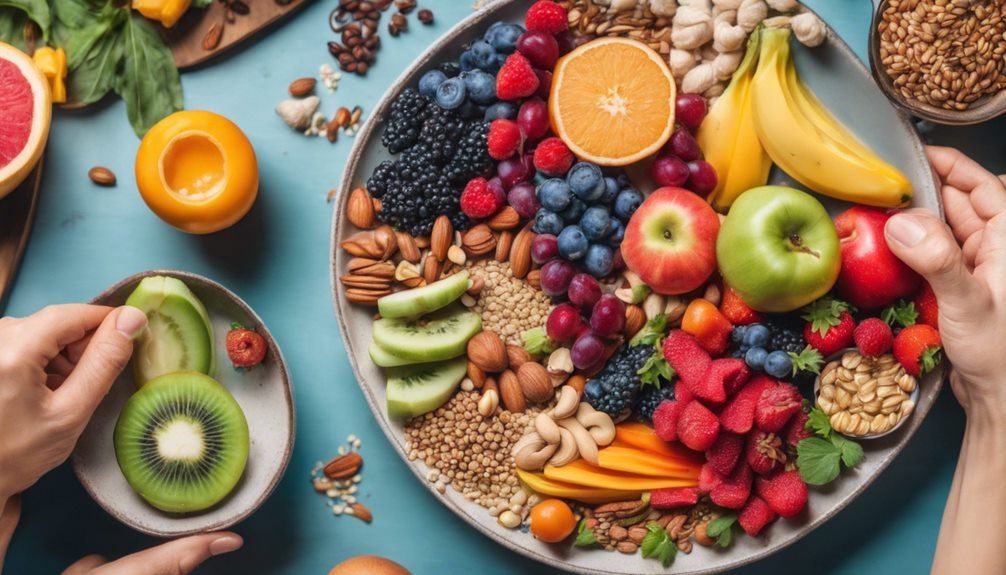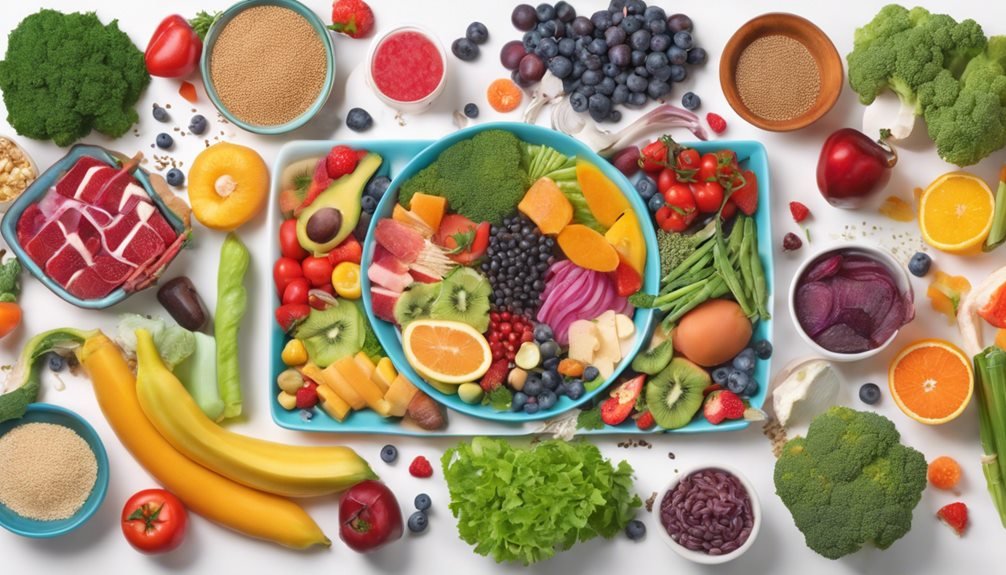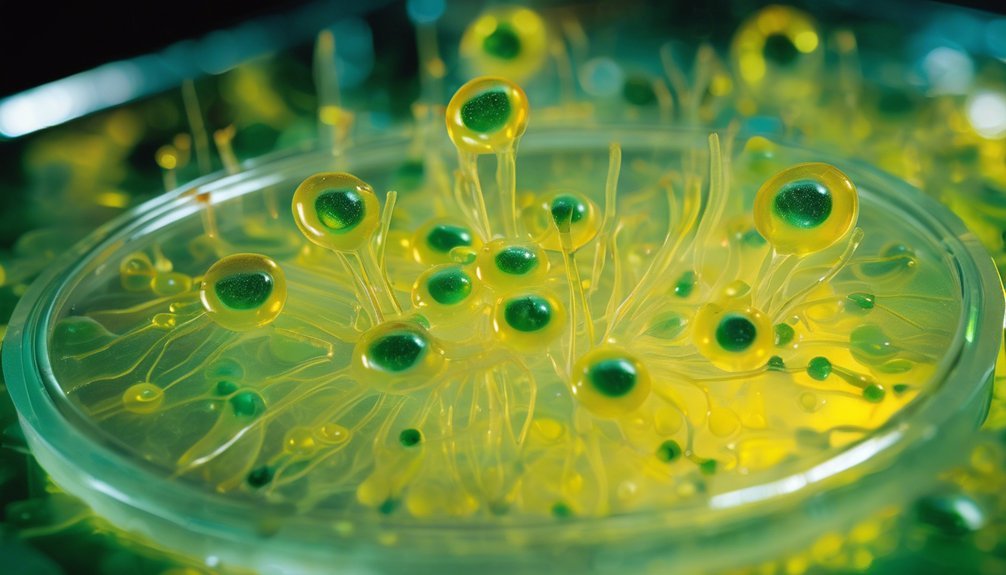Embarking on the path to cancer recovery is like navigating a dense forest with hidden treasures waiting to be discovered. As you consider the role of plant-based diets in this journey, you'll find a wealth of potential benefits that may surprise you. From reducing inflammation to boosting immune function, these diets offer a promising avenue for reclaiming your health post-treatment. But what specific elements make plant-based diets so instrumental in your recovery process? Join us as we uncover the intricate relationship between plant-based nutrition and cancer recovery, shedding light on how these dietary choices can make a meaningful impact on your healing journey.
Key Takeaways
- High fiber aids digestion and reduces inflammation.
- Antioxidants boost immune function and aid cell repair.
- Optimal nutrient intake reduces inflammation levels.
- Meal planning tools and services support recovery.
- Consider sustainability and ethical factors in dietary choices.
Benefits of Plant-Based Diets
Plant-Based diets offer a myriad of benefits that can significantly aid in cancer recovery. One key advantage is the high fiber content found in plant-based foods. Fiber plays a crucial role in aiding digestion and promoting gut health, which is particularly important during cancer treatment. Additionally, fiber helps regulate blood sugar levels and can reduce inflammation in the body, which is beneficial for overall health and recovery.
Another important benefit of plant-based diets is the impact on energy levels. Plant-based foods are rich in nutrients that can provide sustainable energy throughout the day. By incorporating a variety of fruits, vegetables, whole grains, and legumes into your diet, you can experience a steady source of energy that can help combat fatigue often experienced during cancer treatment.
Choosing a plant-based diet not only supports your body's recovery but also contributes to overall well-being. By focusing on fiber-rich foods and nourishing your body with plant-based nutrients, you're taking proactive steps to promote healing and enhance your energy levels throughout the cancer recovery process.
Role of Antioxidants in Recovery
Rich in vitamins and minerals, antioxidants play a crucial role in supporting your body's recovery process after cancer treatment. Including antioxidant-rich foods in your diet can provide essential support during your healing journey.
Dietary antioxidants, such as vitamin C, vitamin E, and beta-carotene, help combat oxidative stress caused by cancer treatments, which can lead to inflammation and cell damage. By incorporating foods like berries, nuts, seeds, and leafy greens, you can boost your antioxidant intake and aid in the repair and regeneration of healthy cells.
Research suggests that a diet rich in antioxidants may help reduce the risk of cancer recurrence and improve overall health outcomes post-treatment. These powerful compounds not only protect your cells from further damage but also support your immune system, enhancing its ability to fight off potential threats.
As you focus on incorporating antioxidant-rich foods into your meals, remember that each bite is a step towards a healthier and stronger recovery. Your dedication to nourishing your body with these healing nutrients can make a significant impact on your recovery journey.
Importance of Phytonutrients
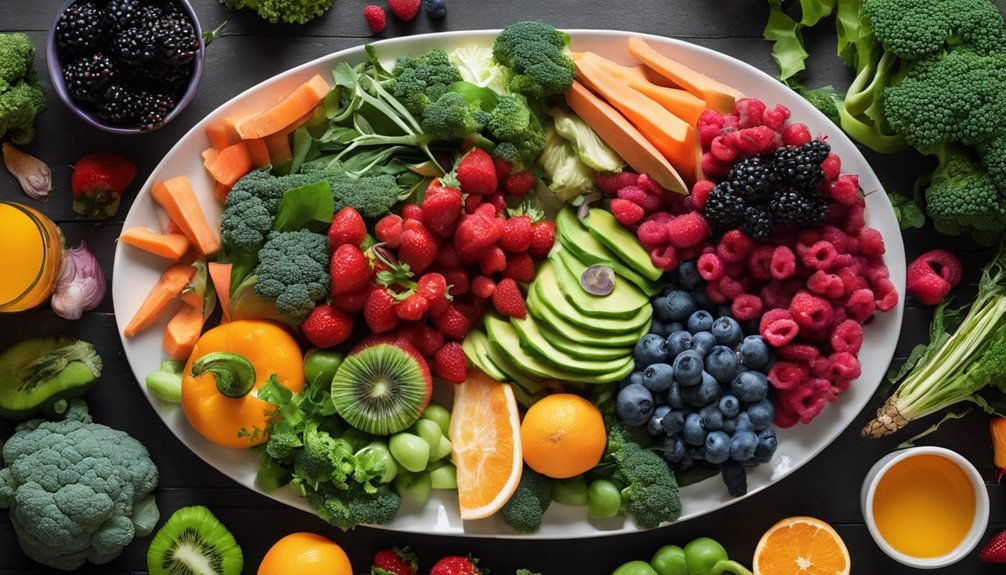
Supporting your body's recovery journey involves not only focusing on antioxidants but also understanding the importance of phytonutrients. Phytonutrients are natural compounds found in plants that play a crucial role in disease prevention and cellular repair. These powerful substances are responsible for the vibrant colors in fruits and vegetables and offer numerous health benefits.
By incorporating a variety of colorful plant foods into your diet, you provide your body with a rich source of phytonutrients that can help boost your immune system and promote healing.
Studies have shown that phytonutrients have antioxidant and anti-inflammatory properties, which are essential for protecting your cells from damage and supporting overall health. Additionally, these plant-based compounds have been linked to reducing the risk of chronic diseases such as cancer, heart disease, and diabetes.
Impact on Inflammation Levels
To understand the impact of phytonutrients on inflammation levels, it's crucial to recognize their potent role in mitigating cellular damage and promoting overall health. When it comes to inflammation markers and dietary interventions, plant-based diets have shown promising results in reducing inflammation levels and supporting the body's healing processes.
Here are four ways in which plant-based diets can positively impact inflammation levels:
- Rich in Anti-Inflammatory Compounds: Plant foods are packed with antioxidants and anti-inflammatory compounds that help combat inflammation at a cellular level.
- Balanced Omega-3 to Omega-6 Ratio: Plant-based diets often have a healthier balance of omega-3 to omega-6 fatty acids, which can help reduce inflammation in the body.
- Reduced Intake of Pro-Inflammatory Foods: By avoiding or minimizing animal products and processed foods, plant-based diets lower the intake of pro-inflammatory substances that can exacerbate inflammation.
- Promotion of Gut Health: Plant-based diets are high in fiber and promote a healthy gut microbiome, which can help regulate inflammation and support overall immune function.
Enhancing Immune Function
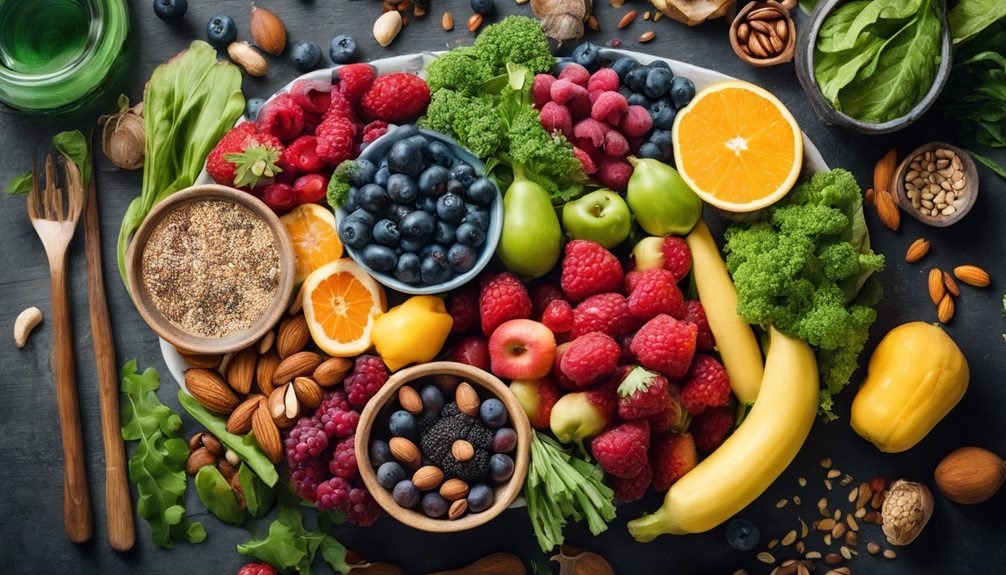
Incorporating specific nutrients and dietary practices can play a crucial role in enhancing your immune function during cancer recovery. Boosting immunity is essential for your body to fight off infections and support overall health. By focusing on plant-based foods rich in vitamins, minerals, and antioxidants, you can provide your immune system with the necessary support it needs to function optimally. Here are some key nutrients and dietary tips to enhance your immune function:
| Nutrient | Food Sources | Benefits |
|---|---|---|
| Vitamin C | Citrus fruits, bell peppers, strawberries | Supports immune cell function and helps with wound healing |
| Zinc | Legumes, seeds, nuts, whole grains | Essential for immune cell development and function |
| Beta-carotene | Carrots, sweet potatoes, kale, spinach | Acts as an antioxidant, supporting immune response and reducing inflammation |
Gut Health and Plant-Based Diets
How do plant-based diets impact gut health during cancer recovery? Transitioning to a plant-based diet can significantly benefit your gut health during this critical time. Here's how:
- Supporting Gut Microbiota: Plant-based diets rich in fruits, vegetables, whole grains, and legumes promote the growth of beneficial gut bacteria, which play a crucial role in supporting your immune system and overall health.
- Increasing Fiber Intake: Plants are naturally high in fiber, which helps regulate bowel movements, promotes a healthy gut environment, and supports the growth of beneficial bacteria in your intestines.
- Reducing Inflammation: Plant-based diets are known to be anti-inflammatory, which can help reduce inflammation in the gut, supporting the healing process during cancer recovery.
- Enhancing Nutrient Absorption: The high fiber content in plant-based foods can aid in better nutrient absorption, ensuring your body receives the essential vitamins and minerals needed for recovery.
Managing Side Effects With Diet
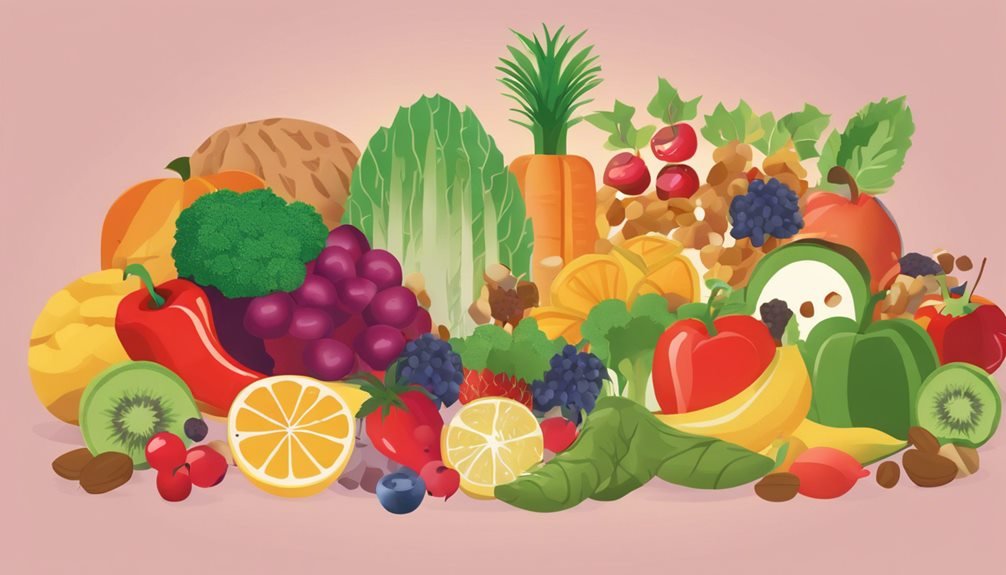
After focusing on the positive impact of plant-based diets on gut health during cancer recovery, it's important to address how diet can help manage the side effects that may arise during this challenging time.
When undergoing treatment, maintaining proper nutrient absorption is crucial for your overall well-being. A plant-based diet rich in fruits, vegetables, whole grains, and legumes can support your digestive health and aid in nutrient absorption.
To manage side effects like nausea or digestive discomfort, consider incorporating foods that are gentle on the stomach, such as cooked vegetables, soups, and smoothies. Opt for easily digestible sources of protein like tofu or lentils. Additionally, stay hydrated and aim for smaller, more frequent meals to ease digestion.
Plant-Based Protein Sources
To boost your protein intake while following a plant-based diet during cancer recovery, diversifying your sources can be key. Here are some protein alternatives and cooking techniques to help you maintain a balanced diet:
- Legumes: Incorporate lentils, chickpeas, black beans, and edamame into your meals. These are versatile and can be added to salads, soups, or stir-fries.
- Nuts and Seeds: Snack on almonds, walnuts, chia seeds, or flaxseeds for a protein boost. You can also sprinkle them on top of yogurt, oatmeal, or smoothie bowls.
- Tofu and Tempeh: Experiment with these soy-based products in stir-fries, sandwiches, or as a meat substitute in your favorite dishes.
- Whole Grains: Quinoa, brown rice, farro, and barley are excellent sources of protein. Try using them as a base for buddha bowls or as a side dish to complement your meals.
Optimizing Nutrient Intake
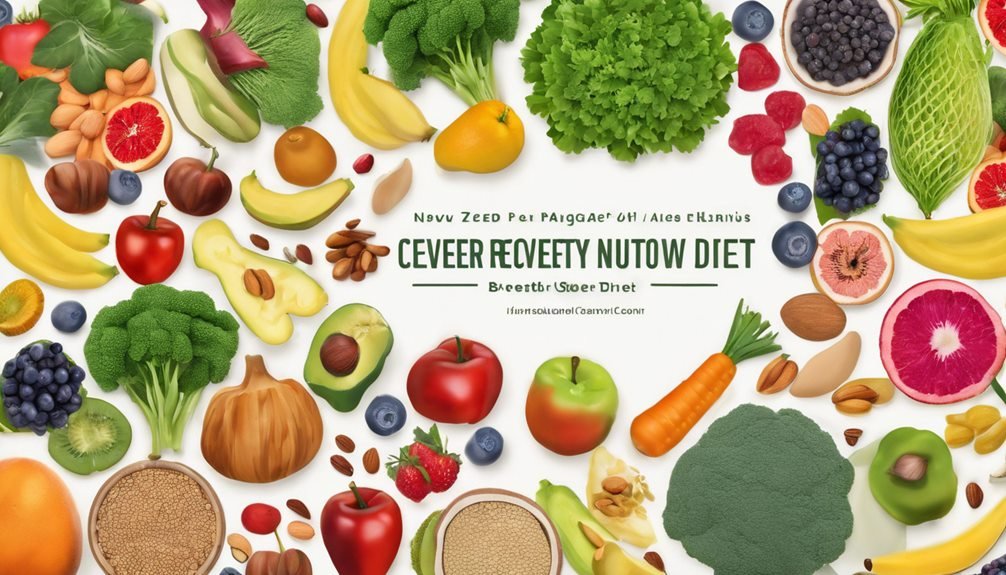
When focusing on optimizing nutrient intake during cancer recovery, it is crucial to pay attention to the quality and variety of foods you consume. Ensuring a balance of essential nutrients is vital for supporting your body's healing process and overall well-being. Here are some key points to keep in mind when it comes to food variety and nutrient balance:
| Food Variety | Nutrient Balance |
|---|---|
| Include a wide range of fruits, vegetables, whole grains, legumes, nuts, and seeds in your diet. | Aim to incorporate a variety of vitamins, minerals, antioxidants, and phytonutrients to support your immune system and promote healing. |
| Experiment with different plant-based protein sources such as tofu, tempeh, lentils, and quinoa to ensure you are getting an adequate intake of essential amino acids. | Monitor your intake of macronutrients like carbohydrates, proteins, and fats to maintain energy levels and support tissue repair. |
| Incorporate colorful foods like berries, leafy greens, and bell peppers to maximize the diversity of nutrients you consume. | Stay hydrated and consider talking to a healthcare provider or a dietitian to determine if any specific supplements are needed to address potential deficiencies. |
Meal Planning Tips for Recovery
During cancer recovery, meal planning plays a crucial role in supporting your body's healing journey. Here are some practical tips to help you navigate meal planning during this critical time:
- Utilize Kitchen Tools: Invest in kitchen tools like a high-speed blender, food processor, and sharp knives to make meal preparation easier and more efficient.
- Explore Recipe Resources: Look for plant-based recipe books, websites, and blogs to find delicious and nutritious meal ideas that can support your recovery journey.
- Consider Meal Delivery Services: Take advantage of meal delivery services that offer plant-based options to save time and energy during your recovery period.
- Join Cooking Classes: Enroll in virtual or in-person cooking classes to learn new plant-based cooking techniques and get inspired to create nourishing meals tailored to your needs.
Sustainability and Ethical Considerations
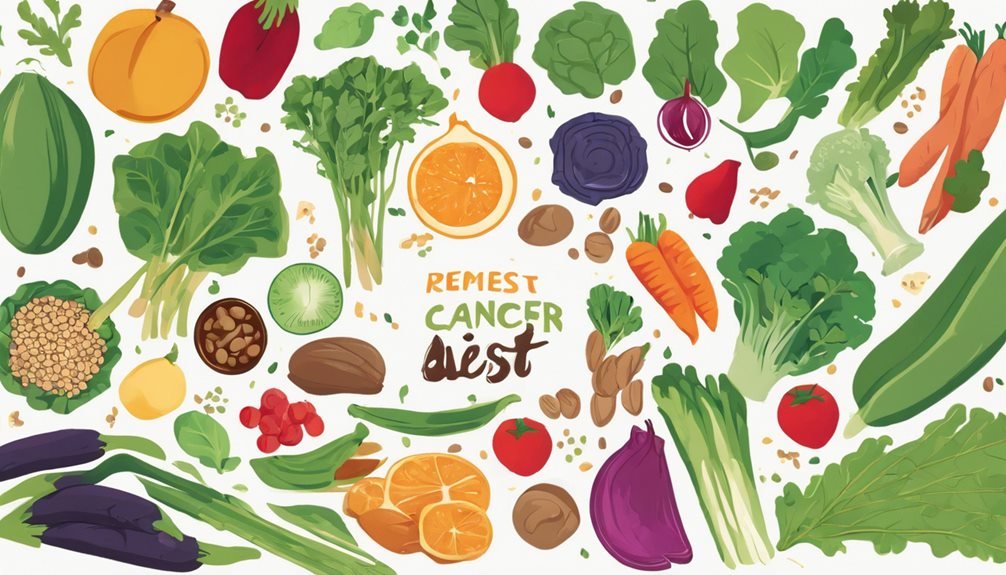
Navigating plant-based diets during cancer recovery not only impacts your health but also raises important questions about sustainability and ethical considerations. When considering sustainability, plant-based diets have a lower environmental impact compared to animal-based diets. By choosing plant-based options, you can reduce your carbon footprint and contribute to a more sustainable food system.
Additionally, plant-based diets align with concerns about animal welfare, as they often involve fewer animal products, promoting ethical treatment of animals.
Personal beliefs and cultural considerations play a significant role in your dietary choices. It's important to reflect on how your values and traditions influence your decision to adopt a plant-based diet. Understanding the connection between your beliefs and dietary choices can help you navigate any challenges that may arise during your cancer recovery journey.
Future Research Directions
To chart the course for advancements in the field of plant-based diets and cancer recovery, researchers are increasingly focusing on future research directions that promise to expand our understanding of the relationship between dietary choices and health outcomes. When considering the future of plant-based diets in cancer recovery, it's crucial to delve into the following key areas:
- Long Term Outcomes: Research will aim to investigate the impact of plant-based diets on long-term cancer recovery rates and overall survival, providing valuable insights into the sustained benefits of such dietary choices.
- Dietary Adherence: Future studies will explore strategies to enhance dietary adherence among cancer survivors, ensuring that individuals can successfully maintain a plant-based diet over time to support their recovery journey.
- Optimal Nutrient Intake: Research will focus on identifying the specific nutrients within plant-based diets that play a significant role in cancer recovery, helping individuals tailor their dietary choices for optimal health outcomes.
- Psychosocial Support: Future studies will examine the importance of psychosocial support in promoting dietary adherence and overall well-being during cancer recovery, highlighting the interconnected nature of mental health and dietary choices.
Frequently Asked Questions
Can a Plant-Based Diet Prevent Cancer Recurrence?
A plant-based diet rich in antioxidants and fiber plays a vital role in cancer prevention. Antioxidants help combat free radicals that can damage cells, potentially leading to cancer.
Fiber aids in digestion and helps regulate blood sugar levels, reducing inflammation and supporting overall health. By incorporating these elements into your diet, you're taking proactive steps to lower your risk of cancer recurrence and improve your overall well-being.
Are There Specific Plant Foods to Avoid During Recovery?
During recovery, pay attention to potential food sensitivities and nutrient deficiencies. Some plant foods that individuals may need to avoid include high-oxalate foods like spinach and almonds if you have kidney issues.
Cruciferous vegetables like broccoli can interfere with thyroid medication absorption, so moderation is key. Consult with a dietitian to ensure you're getting all the nutrients you need while avoiding foods that may hinder your recovery process.
How Can I Ensure I'm Getting Enough Protein?
To ensure you're getting enough protein, focus on diverse plant-based protein sources like legumes, nuts, seeds, and tofu. Incorporate nutrient-balanced meals by including whole grains, fruits, and vegetables. Consider meal planning to guarantee adequate protein intake. If needed, consult a dietitian for personalized advice on supplementation. Remember, a well-rounded plant-based diet can provide all the essential nutrients your body needs for recovery and overall health.
Can Plant-Based Diets Help With Chemotherapy Side Effects?
Plant-based diets can indeed help alleviate some chemotherapy side effects. They're rich in nutrients that promote overall health, including digestive health.
However, it's important to ensure you're getting enough protein through sources like legumes, tofu, and nuts. Nutritional supplements can also be beneficial to fill any gaps in your diet.
Consult with a healthcare provider or a registered dietitian to create a well-rounded plant-based eating plan that supports your recovery.
Is Organic Produce Necessary for a Plant-Based Cancer Recovery Diet?
Looking to save some cash while helping the planet? You can opt for budget-friendly alternatives that are just as nutritious as organic produce for your plant-based cancer recovery diet.
While organic options have their benefits, conventional produce can still offer the essential nutrients you need. Consider the environmental impact of your choices and choose wisely.
Making sustainable choices doesn't have to break the bank when it comes to your health journey.
Conclusion
As you navigate your cancer recovery journey, remember that plant-based diets can be your steadfast ally. With their abundance of antioxidants, phytonutrients, and immune-boosting nutrients, these diets offer a path towards healing and well-being. Embrace the power of nutrient-dense foods, reduce inflammation, and support your body's natural ability to heal. Trust in the nourishing benefits of plant-based eating, and let it guide you towards a brighter, healthier future.
